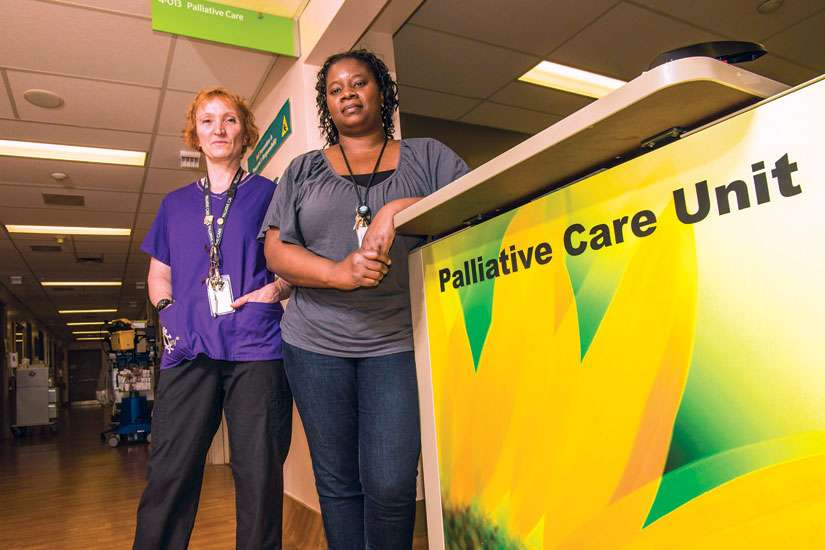“We have the law and we can’t change the law but what we can do is fight for more and better palliative care,” said Ian Gentles, research director for the deVeber Institute for Bioethics and Social Research. “It will help save us from the corruption of turning all of our medical practitioners, our doctors and our nurses, into killers.”
That requires first and foremost a commitment by provincial governments to provide increased funding for palliative care.
“Of all the range of medical treatments palliative care is relatively inexpensive because it doesn’t involve any expensive surgeries or expensive equipment or expensive drugs,” said Gentles. “All it involves is keeping the patient comfortable, hydrated and fed, and when necessary having the pain managed.”
Since 2005 Ontario has been allocating a percentage of its health budget to support residential hospice care and expand the existing palliative care network.
Earlier this year the province announced an additional $75 million will be invested in the sector over the next three years. That money will be added to the $80 million already allocated over the next three years to bring total funding to $155 million or $51.66 million per year. Those additional funds will increase funding to 39 facilities and support the establishment of 20 new hospice facilities.
“Supporting hospices so they can continue to provide excellent care is an important part of our government’s commitment to improve palliative and end-of-life care across the province,” said Dr. Eric Hoskins, the province’s Minister of Health and Long-Term Care, in a June 10 press release announcing the funding.
Gentles called Ontario’s move a step in the right direction that needs to continue beyond the three-year mark.
“We have to make sure that in the remotest corners of this country that everybody gets good palliative care when they need it,” he said.
“That’s a matter of plugging it into the provincial health care budget (indefinitely).”
Toronto Cardinal Thomas Collins expressed similar sentiments in February when he addressed the federal government’s Special Joint Committee on Physician Assisted Dying.
“Proper palliative care is not available to the majority of Canadians,” he said. “It is a moral imperative for all levels of government in our country to focus attention and resources on providing care which offers effective medical control of pain and even more important loving accompaniment of those who are approaching their inevitable end of life on Earth.”
During his five-minute address Collins noted that “our worth as a society will be measured by the support we give to the vulnerable,” and to offer the vulnerable death is the complete opposite of offering support.
More recently on Canada’s west coast Archbishop Michael Miller agreed with Gentles in a piece the Archbishop of Vancouver wrote for LifeSite News.
“With assisted suicide now the law of the land and claiming its first victims, I am greatly alarmed by the impact it is having,” opened the article dated July 5. “We need to redouble efforts to help members of our communities who feel that suicide is the answer to their sufferings. We must call on our governments and on the medical community to provide better and more accessible palliative are. “
Rick Firth, president and CEO of Hospice Palliative Care Ontario, which represents both the hospices and employees, said the change needs to come from within the medical community more than from government — although he isn’t opposed to increased funding.
“An approach would be to train more primary caregivers to do palliative care so that people don’t have to leave their family doctor and go to a specialist to receive the care that they need,” said Firth. “We’ve got a system that is very focused on acute care and cure and often palliative care referrals come in late in the game.”
He said many patients who are still technically in the “curative treatment mode” could benefit from components of the palliative care philosophy such as advanced care planning, grief counselling and pain management approaches. Firth said medical schools should start training doctors to embed these concepts into routine visits with patients nearing their final stage of life.
“The biggest thing that we can do right now is education of our health care workers and the public on palliative care,” he said. “My biggest concern would be the individual that makes the decision for assisted death because they couldn’t get access to good palliative care. We have a moral imperative, as well as a planning imperative, to make sure that no one in Ontario takes that option because they do not have access to good palliative care.”
Gentles said when someone is presented with both medical assistance in dying and good palliative care, the patient almost always opts for the latter.
“It saves lives and upholds the Christian respect for life that Catholics and all other Christians should adhere to.”


